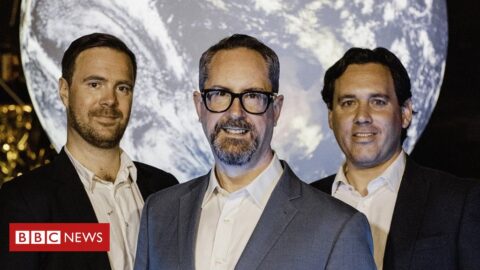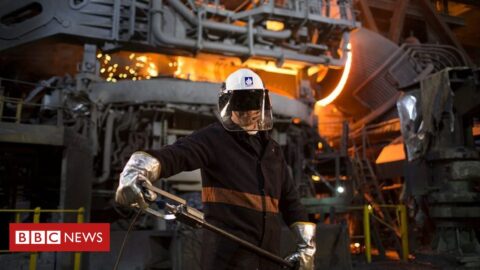
Kemi Badenoch has said her party will remove all net zero requirements on oil and gas companies drilling in the North Sea if elected.
The Conservative leader is to formally announce the plan to focus solely on “maximising extraction” to get “all our oil and gas out of the North Sea” in a speech in Aberdeen on Tuesday,
She will claim that net zero measures mean households end up “paying the price through higher energy bills”.
The Labour government has committed to banning new exploration licences. A spokesperson said: “We’ll take no lectures from Kemi Badenoch. Every family and business paid the price of the Conservatives’ failure to secure the UK’s energy.”
Exploring new fields would “not take a penny off bills” or improve energy security and would “only accelerate the worsening climate crisis”, a government spokesperson warned.
Badenoch signalled a significant change in Conservative climate policy when she announced earlier this year that reaching net zero would be “impossible” by 2050.
Successive UK governments have pledged to reach the target by 2050 and it was written into law by Theresa May in 2019. It means the UK must cut carbon emissions until it removes as much as it produces, in line with the 2015 Paris Climate Agreement.
Now Badenoch has said that requirements to work towards net zero are a burden on oil and gas producers in the North Sea which are damaging the economy and which she would remove.
The Tory leader said a Conservative government would scrap the need to reduce emissions or to work on technologies such as carbon storage.
Badenoch said it was “absurd” the UK was leaving “vital resources untapped” while “neighbours like Norway extracted them from the same sea bed”.
Her plan echoes US President Donald Trump’s pledge to “drill, baby, drill” and embark on new oil and gas exploration. It is a reversal of former President Joe Biden’s Inflation Reduction Act, which channelled billions of dollars into clean energy.
In 2023, then Prime Minister Rishi Sunak granted 100 new licences to drill in the North Sea which he said at the time was “entirely consistent” with net zero commitments.
Since then, major energy companies such as BP have U-turned on the level of investment in renewables to focus on increasing oil and gas production in order to boost profitability.
Tessa Khan, executive director of Uplift, a research and campaign group, said Badenoch’s plan was “reckless” and would not “bring down energy bills”.
“These rules are the bare minimum to needed hold the industry to account, and removing them will simply mean more emissions, more environmental harm and more handouts to oil and gas giants at the nation’s expense,” she said.
Reform UK has said it will abolish the push for net zero if elected.
But Liberal Democrat environment spokesperson Tim Farron said scrapping requirements to reduce emissions “is nothing short of irresponsible environmental vandalism”.
He said the UK “should be setting our sights on leading the world in clean energy, in off shore wind, instead of falling back to a dependency on fossil fuels”.
Research shows that 2024 was the first calendar year where the average temperature exceeded 1.5°C.
This made it the hottest year since records began in 1850, according to the Copernicus Climate Change Service, which is managed by the European Commission and uses data from the European Union’s space programme.
The UK was one of 200 countries to sign the Paris Agreement who agreed to “pursue efforts” to limit global temperature rises to 1.5C and keep them “well below” 2.0C above those recorded in pre-industrial times.
Gillian Martin, the Scottish government’s energy secretary, said: “Too many are offering easy answers when what we need are the right answers.”
She said that because the North Sea basin is “maturing”, the “responsible approach is to plan now for this eventuality, transitioning to new fuels and sustainable energy in a way that protects our energy security and Scotland’s highly skilled workforce in the North East”.
But David Whitehouse, chief executive of Offshore Energies UK, a trade organisation representing the industry, said: “The choice is clear – do we prioritise our homegrown energy or choose to sacrifice our jobs to rely on imports?
“While we use oil and gas, let us produce it here in the UK responsibly, alongside an accelerated rollout of renewables. In a country importing 40% of its energy needs, we need both.”
The current government said it had made the “biggest ever investment in offshore wind and three first of a kind carbon capture and storage clusters”.
Carbon capture and storage facilities aim to prevent carbon dioxide (CO2) produced from industrial processes and power stations from being released into the atmosphere.
Most of the CO2 produced is captured, transported and then stored deep underground.
It is seen by the likes of the International Energy Agency and the Climate Change Committee as a key element in meeting targets to cut the greenhouse gases driving dangerous climate change.
Green Party MP Ellie Chowns, said: “By far the best option for British growth, British jobs is investment in that green industrial transformation. Not the technology of the old century the 20th century, we need to invest in the technology of the 21st century.”
Additional reporting by Dearbail Jordan.









Recent Comments